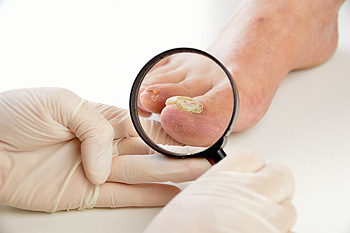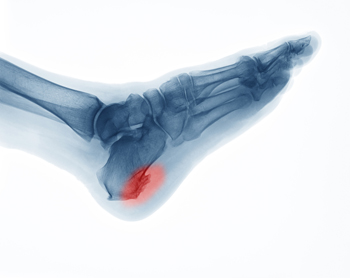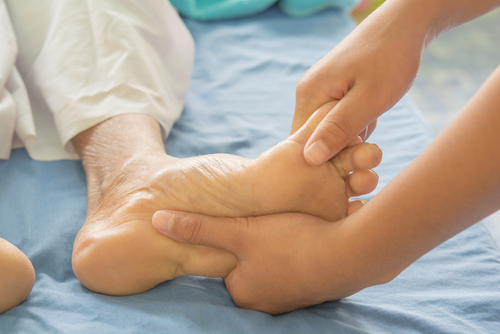Connect With Us
Blog
Items filtered by date: December 2020
Is Toenail Fungus Common?
 A fungal infection of the toenails is known as onychomycosis, and it is considered to be contagious. Toenail fungus often affects up to ninety percent of elderly people. The type of fungus that causes this ailment lives and thrives in warm and moist environments. These can consist of public swimming pools, shower room floors, and surrounding areas. It is beneficial to wear appropriate shoes while in these places, and this may help to control outbreaks of toenail fungus. Common symptoms that are typically associated with this condition can include a thickening and yellowing of the toenails, often starting with the big toe. In severe cases, the nail may become brittle and lift off of the nail bed. If you have toenail fungus, please confer with a podiatrist who can recommend correct treatment options for you.
A fungal infection of the toenails is known as onychomycosis, and it is considered to be contagious. Toenail fungus often affects up to ninety percent of elderly people. The type of fungus that causes this ailment lives and thrives in warm and moist environments. These can consist of public swimming pools, shower room floors, and surrounding areas. It is beneficial to wear appropriate shoes while in these places, and this may help to control outbreaks of toenail fungus. Common symptoms that are typically associated with this condition can include a thickening and yellowing of the toenails, often starting with the big toe. In severe cases, the nail may become brittle and lift off of the nail bed. If you have toenail fungus, please confer with a podiatrist who can recommend correct treatment options for you.
If left untreated, toenail fungus may spread to other toenails, skin, or even fingernails. If you suspect you have toenail fungus it is important to seek treatment right away. For more information about treatment, contact one of our podiatrists of Crosstown Podiatry. Our doctors can provide the care you need to keep you pain-free and on your feet.
Symptoms
- Warped or oddly shaped nails
- Yellowish nails
- Loose/separated nail
- Buildup of bits and pieces of nail fragments under the nail
- Brittle, broken, thickened nail
Treatment
If self-care strategies and over-the-counter medications does not help your fungus, your podiatrist may give you a prescription drug instead. Even if you find relief from your toenail fungus symptoms, you may experience a repeat infection in the future.
Prevention
In order to prevent getting toenail fungus in the future, you should always make sure to wash your feet with soap and water. After washing, it is important to dry your feet thoroughly especially in between the toes. When trimming your toenails, be sure to trim straight across instead of in a rounded shape. It is crucial not to cover up discolored nails with nail polish because that will prevent your nail from being able to “breathe”.
In some cases, surgical procedure may be needed to remove the toenail fungus. Consult with your podiatrist about the best treatment options for your case of toenail fungus.
If you have any questions, please feel free to contact our offices located in Wayne, Montclair, and Randolph, NJ . We offer the newest diagnostic and treatment technologies for all your foot care needs.
Who Should Be Under the Care of a Podiatrist?
 There are a variety of injuries and issues that can affect the feet. Therefore, proper foot care is important, and those who have diabetes, arthritis, or poor blood flow should be under the care of a podiatrist. Common foot issues that podiatrists can care for include ligament sprains, broken bones, heel pain, warts, athlete’s foot, and ingrown toenails. They can prescribe medications for these foot-related issues, perform surgery, prescribe orthotics, and provide recommendations and solutions for your particular foot problem. Those who are older should be under the care of a podiatrist as well, because as the feet age, a variety of issues, such as bunions, arthritis, or foot pain, may become more prominent and can lead to falls. If you are in one of these risk groups, or believe that you have injured your foot, it is highly recommended that you are under the care of a podiatrist.
There are a variety of injuries and issues that can affect the feet. Therefore, proper foot care is important, and those who have diabetes, arthritis, or poor blood flow should be under the care of a podiatrist. Common foot issues that podiatrists can care for include ligament sprains, broken bones, heel pain, warts, athlete’s foot, and ingrown toenails. They can prescribe medications for these foot-related issues, perform surgery, prescribe orthotics, and provide recommendations and solutions for your particular foot problem. Those who are older should be under the care of a podiatrist as well, because as the feet age, a variety of issues, such as bunions, arthritis, or foot pain, may become more prominent and can lead to falls. If you are in one of these risk groups, or believe that you have injured your foot, it is highly recommended that you are under the care of a podiatrist.
If you are dealing with pain in your feet and ankles, you may want to seek help from a podiatrist. Feel free to contact one of our podiatrists from Crosstown Podiatry. Our doctors can provide the care you need to keep you pain-free and on your feet.
What Is a Podiatrist?
A podiatrist is a doctor of podiatric medicine who diagnoses and treats conditions of the foot, ankle, and related structures of the leg. Your podiatrist may specialize in a certain field such as sports medicine, wound care, pediatrics, and diabetic care. Podiatrists have the ability to become board certified through training, clinical experience, and then taking an exam.
What Do Podiatrists Do?
On a daily basis, a podiatrist may perform the following activities:
- Diagnose foot ailments such as ulcers, tumors, fractures, etc.
- Use innovative methods to treat conditions
- Use corrective orthotics, casts, and strappings to correct deformities
- Correct walking patterns and balance
- Provide individual consultations to patients
It is very important that you take care of your feet. It’s easy to take having healthy feet for granted, however foot problems tend to be among the most common health conditions. Podiatrists can help diagnose and treat a variety of feet related conditions, so it is crucial that you visit one if you need assistance.
If you have any questions please feel free to contact our offices located in Wayne, Montclair, and Randolph, NJ . We offer the newest diagnostic and treatment technologies for all your foot and ankle needs.
Are Bunions Affecting Your Everyday Life?
Stretching the Feet May Help Heel Spurs
 A heel spur is defined as a bony growth that gradually develops on the back or bottom of the heel bone. It can cause severe pain and discomfort, and it may even be difficult to walk. A heel spur can be caused by arthritis, tendonitis, or due to a heel fracture. Mild relief may be found when the affected foot is rested and pain medication for inflammation is taken. Additionally, it is beneficial to perform specific stretches that may help to strengthen the overall foot. If you have heel pain, it may be indicative of a heel spur. It is strongly suggested that you speak with a podiatrist for a proper diagnosis and to determine what the best treatment is for you.
A heel spur is defined as a bony growth that gradually develops on the back or bottom of the heel bone. It can cause severe pain and discomfort, and it may even be difficult to walk. A heel spur can be caused by arthritis, tendonitis, or due to a heel fracture. Mild relief may be found when the affected foot is rested and pain medication for inflammation is taken. Additionally, it is beneficial to perform specific stretches that may help to strengthen the overall foot. If you have heel pain, it may be indicative of a heel spur. It is strongly suggested that you speak with a podiatrist for a proper diagnosis and to determine what the best treatment is for you.
Heel spurs can be incredibly painful and sometimes may make you unable to participate in physical activities. To get medical care for your heel spurs, contact one of our podiatrists from Crosstown Podiatry. Our doctors will do everything possible to treat your condition.
Heels Spurs
Heel spurs are formed by calcium deposits on the back of the foot where the heel is. This can also be caused by small fragments of bone breaking off one section of the foot, attaching onto the back of the foot. Heel spurs can also be bone growth on the back of the foot and may grow in the direction of the arch of the foot.
Older individuals usually suffer from heel spurs and pain sometimes intensifies with age. One of the main condition's spurs are related to is plantar fasciitis.
Pain
The pain associated with spurs is often because of weight placed on the feet. When someone is walking, their entire weight is concentrated on the feet. Bone spurs then have the tendency to affect other bones and tissues around the foot. As the pain continues, the feet will become tender and sensitive over time.
Treatments
There are many ways to treat heel spurs. If one is suffering from heel spurs in conjunction with pain, there are several methods for healing. Medication, surgery, and herbal care are some options.
If you have any questions feel free to contact our offices located in Wayne, Montclair, and Randolph, NJ . We offer the latest in diagnostic and treatment technology to meet your needs.
Read more about How to Treat Heel SpursWhat Can Foot Reflexology Accomplish?
 A common type of foot therapy that patients may find beneficial is foot reflexology. The goal of massaging the feet is to promote balance in the body, and it may be effective in reducing tension. Additionally, endorphins may be stimulated, which may result in a decrease in pain and stress. This type of therapy is administered by touching the feet in specific areas with firm pressure. This form of therapy may help to heal foot conditions such as gout, specific types of foot ulcers, or an injury to the ankle or foot. If you would like more information about the benefits that reflexology may have for the feet, please consult with a podiatrist.
A common type of foot therapy that patients may find beneficial is foot reflexology. The goal of massaging the feet is to promote balance in the body, and it may be effective in reducing tension. Additionally, endorphins may be stimulated, which may result in a decrease in pain and stress. This type of therapy is administered by touching the feet in specific areas with firm pressure. This form of therapy may help to heal foot conditions such as gout, specific types of foot ulcers, or an injury to the ankle or foot. If you would like more information about the benefits that reflexology may have for the feet, please consult with a podiatrist.
Foot therapy is often necessary for those recovering from either foot deformities or foot injuries. If you have concerns regarding therapy, consult with one of our podiatrists from Crosstown Podiatry. Our doctors can provide the care you need to keep you pain-free and on your feet.
Most Common Injuries
People who are active or athletes are prone to a variety of injuries. Therefore, it is often important to take part in physical therapy in order to quickly get back on the right track.
What to Do When Injured
Physical Therapy – This specialized treatment will focus on the affected area, speeding up recovery and the overall healing process. It is a proven method that has helped millions of people return from any injury.
During physical therapy you will undergo regimented training to get back into full form. Training is often very difficult, especially at first when the foot feels weak. Physical therapy often involves:
Basic stretching and twisting exercises – getting the feet’s mobility and flexibility up.
Massaging – the therapist will massage the injured area in order to activate the muscles and relax them.
Strengthening Exercises – this allows the muscles in the affected area to regain their full strength, a vital step towards full recovery.
If you have any questions please feel free to contact our offices located in Wayne, Montclair, and Randolph, NJ . We offer the newest diagnostic tools and technology to treat your foot and ankle needs.

